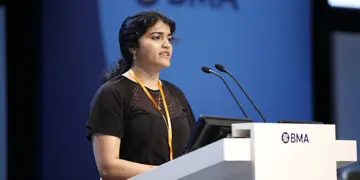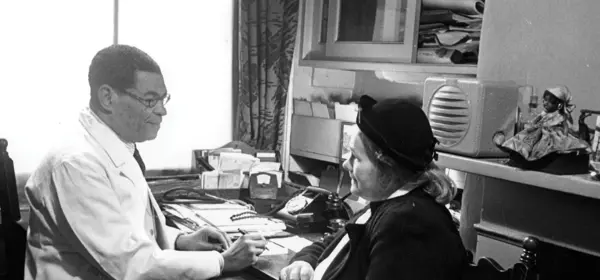‘Placeholder’ doctors face double whammy
‘Placeholder’ doctors face double whammy
Doctors without confirmed job locations also left out of on-call rotas
The BMA will investigate the exclusion of placeholder doctors – graduates who do not get a rotation at the first line of recruitment – from participating in on-call rotas.
Doctors and medical students at the BMA’s 2025 annual representative meeting said the practice could be ‘unsafe’ and ‘unfair’ and urged action to investigate the impacts on doctors’ wellbeing, medico-legal risk and workforce planning.
Representatives voted to pass a motion urging an investigation of the issue and demanding the equitable treatment of all foundation doctors, ensuring that placeholder doctors are offered the same opportunities to undertake on-call shifts as their peers. They also pledged to campaign for clear national guidance to prevent inconsistency between different trusts regarding the placement of placeholder foundation doctors in on-call rotas.
Heather Gunn, an FY1 in Buckinghamshire, proposed the motion – and said she was doing so on behalf of a peer.
She said: ‘It’s Saturday at 6pm and you’re the F1 on ward cover. You’re bleeped to one ward because the patient is becoming unresponsive. While on the ward three other patients become unwell and you receive half a dozen bleeps from including from the bed manager and that all important TCO as well as 30 tasks from the junior ward cover list.
‘Your two seniors are aware of this modern-day Dante’s inferno but won’t be able to help for another 30 minutes. Ladies and gentlemen, this was not a simulation, this was one of my shifts last month. Welcome to the NHS.
‘It’s shifts such as this that allow me a bottom-tier foundation year doctor to undertake more autonomous work and learning to deal with high pressure situations. Yet placeholder F1s are missing out on such opportunities.
‘To add salt to the wounds of being the least prioritised when it comes to job rankings, placeholder doctors now face further disadvantage when it comes to their training, specifically in undertaking out-of-hours work.
‘Two foundation doctors in the same department can have vastly different contracts simply because the almighty rota coordinators and trust managers have failed to include them in the rota.’
Dr Gunn added: ‘There are currently F1s in my cohort who have not undertaken a single out-of-hours shift and are about to become SHOs. In most district hospitals the SHO is the most senior member of the medical team overnight, yet these placeholder doctors have never done a night shift.
‘Quite frankly, this is ludicrous. We are expecting them to take a step up the seniority ladder yet haven’t been provided with the experience for such responsibility. Within the same vein their colleagues are working longer, more gruelling hours to cover gaps in the rota. Tired doctors make mistakes.
‘The bottom line is exclusions of placeholder doctors from out-of-hours shifts is unsafe, unfair and needs to change. It is a lazy oversight from management and is downright dangerous.’
Sanjana Murali, a placeholder doctor in Oxfordshire, supported the motion.
She said: Starting in a new place, having to move, not knowing where I was going to be until two weeks before, I found I was under prioritised by the foundation school. Then I was told I would get no out-of-hours shifts and once again I felt I wasn’t being prioritised.
‘I feel under-prepared moving into F2, I feel that I don't know how to manage out-of-hours, that I don't know how to respond to the bleep, I’ve never attended an arrest scenario. How am I expected to look after a group of patients, a large sub-section of patients who are unwell?
‘I feel that not offering out-of-hours shifts to placeholder doctors not only places an under franchised group in more peril. How can we call this a training programme when we are not training our doctors? Honestly, I feel it is a slap in the face to a group of students already moving into an under-funded NHS.’
It is an issue the BMA has been campaigning on recently. Back in April, it was revealed that nearly 700 medical students across the UK had very little idea where they would have their first job as a doctor this summer.
While thousands of final year students were told which hospital they would be going to, almost 700 were instead given what are known as ‘placeholder’ positions – they have a job as a foundation doctor, but do not know the exact location until a short time before their start date in August. They have been told which medical deanery (the local medical education and training boards) they will be in, but they often span huge geographical areas, or even entire devolved nations, in the case of Wales, Scotland and Northern Ireland.
When assigned a placeholder job, students are left in limbo for months – leaving them unable to make plans for where they will live. For those with caring responsibilities and families it can be an incredibly stressful time as they’re unable to plan for childcare and make the necessary arrangements to start their careers in medicine.
BMA council Professor Phil Banfield and officers from the medical students committee wrote to the health secretary for England, Wes Streeting, asking him to take action in April.
Callum Williams and Elgan Manton-Roseblade, deputy co-chairs for education for the BMA’s medical students committee, said: ‘This happens year on year: final-year medical students facing months of uncertainty and stress, for some during their final medical exams, it is unacceptable.
‘It's paramount that the [Department of Health and Social Care] commits now to giving students their programme details and work schedules at least eight weeks prior to their start dates, in line with the resident doctor contract. They should also receive detailed and frequent communication, both locally and nationally.
‘To prevent students in years to come facing this avoidable stress and anxiety, the UK Foundation Programme Office must receive increased funding, so deaneries don’t have to scramble to find posts for new doctors. It’s also essential that UK medical school graduates must always be guaranteed a foundation programme post and be prioritised over graduates of non-UK medical schools.
‘We’ve written to Wes Streeting to ask him to put steps in place to prevent this happening. It’s essential that we keep doctors in the NHS – and when this is a new doctor’s first experience with NHS employment it increases the risk that they’ll join so many of their colleagues in moving abroad, or leaving medicine entirely.’



